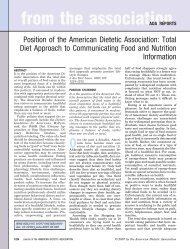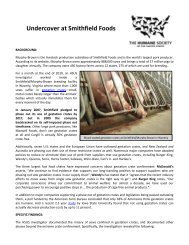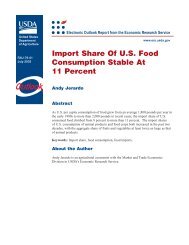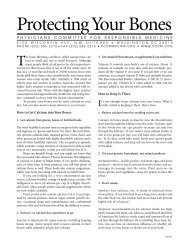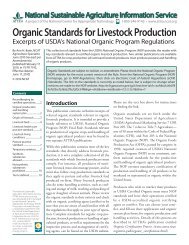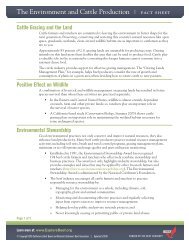THE MYTHS OF VEGETARIANISM Stephen Byrnes, PhD
THE MYTHS OF VEGETARIANISM Stephen Byrnes, PhD
THE MYTHS OF VEGETARIANISM Stephen Byrnes, PhD
You also want an ePaper? Increase the reach of your titles
YUMPU automatically turns print PDFs into web optimized ePapers that Google loves.
Trans-fatty acids, as opposed to saturated fats, have been shown by researchers such as Enig,Mann and Fred Kummerow to be causative factors in accelerated atherosclerosis, coronary heartdisease, cancer and other ailments (52). Trans-fatty acids are found in such modern foods asmargarine and vegetable shortening and foods made with them. Enig and her colleagues havealso shown that excessive omega-6 polyunsaturated fatty acid intake from refined vegetable oilsis also a major culprit behind cancer and heart disease, not animal fats.A recent study of thousands of Swedish women supported Enig’s conclusions and data, andshowed no correlation between saturated fat consumption and increased risk for breast cancer.However, the study did show, as did Enig’s work, a strong link between vegetable oil intake andhigher breast cancer rates (53).The major population studies that supposedly prove the theory that animal fats and cholesterolcause heart disease actually do not upon closer inspection. The Framingham Heart Study is oftencited as proof that dietary cholesterol and saturated fat intake cause heart disease and ill health.Involving about 6,000 people, the study compared two groups over several years at five-yearintervals. One group consumed little cholesterol and saturated fat, while the other consumedhigh amounts. Surprisingly, Dr William Castelli, the study's director, said:In Framingham, Mass., the more saturated fat one ate, the more cholesterol one ate, the morecalories one ate, the lower the person's serum cholesterol ... we found that the people who atethe most cholesterol, ate the most saturated fat, [and] ate the most calories, weighed the leastand were the most physically active. (54)The Framingham data did show that subjects who had higher cholesterol levels and weighedmore ran a slightly higher chance for coronary heart disease. But weight gain and serumcholesterol levels had an inverse correlation with dietary fat and cholesterol intake. In otherwords, there was no correlation at all (55).In a similar vein, the US Multiple Risk Factor Intervention Trial, sponsored by the National Heartand Lung Institute, compared mortality rates and eating habits of 12,000+ men. Those who ateless saturated fat and cholesterol showed a slightly reduced rate of heart disease, but had anoverall mortality rate much higher than the other men in the study (56).Low-fat/cholesterol diets, therefore, are not healthier for people. Studies have shown repeatedlythat such diets are associated with depression, cancer, psychological problems, fatigue, violenceand suicide (57). Women with lower serum cholesterol live shorter lives than women with higherlevels (58). Similar things have been found in men (59).Children on low-fat and/or vegan diets can suffer from growth problems, failure to thrive, andlearning disabilities (60). Despite this, sources from Dr Benjamin Spock to the American HeartAssociation recommend low-fat diets for children! One can only lament the fate of thoseunfortunate youngsters who will be raised by unknowing parents taken in by such genocidalmisinformation.There are many health benefits to saturated fats, depending on the fat in question. Coconut oil,for example, is rich in lauric acid, a potent antifungal and antimicrobial substance. Coconut alsocontains appreciable amounts of caprylic acid, also an effective antifungal (61). Butter from freerangecows is rich in trace minerals, especially selenium, as well as all of the fat-soluble vitaminsand beneficial fatty acids that protect against cancer and fungal infections (62).




